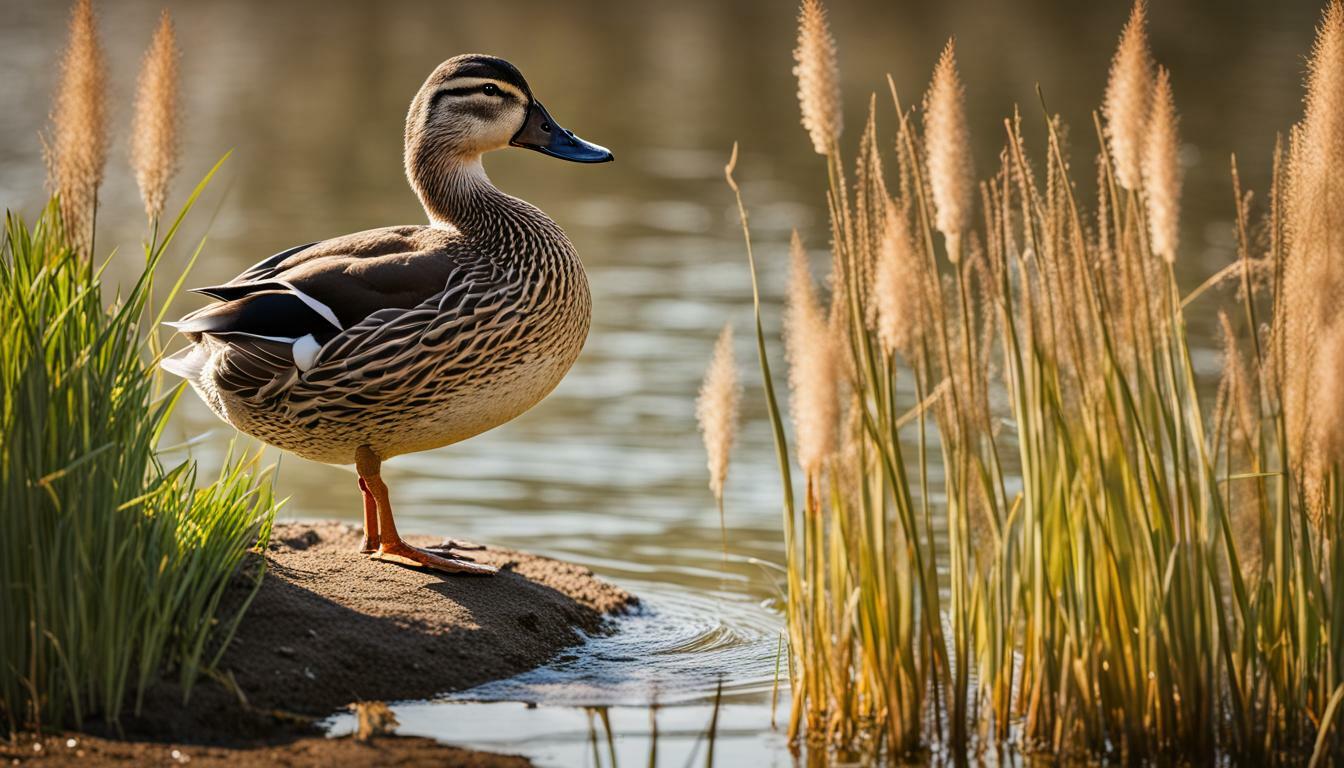Can Ducks Eat Broccoli? Safety Tips for Owners
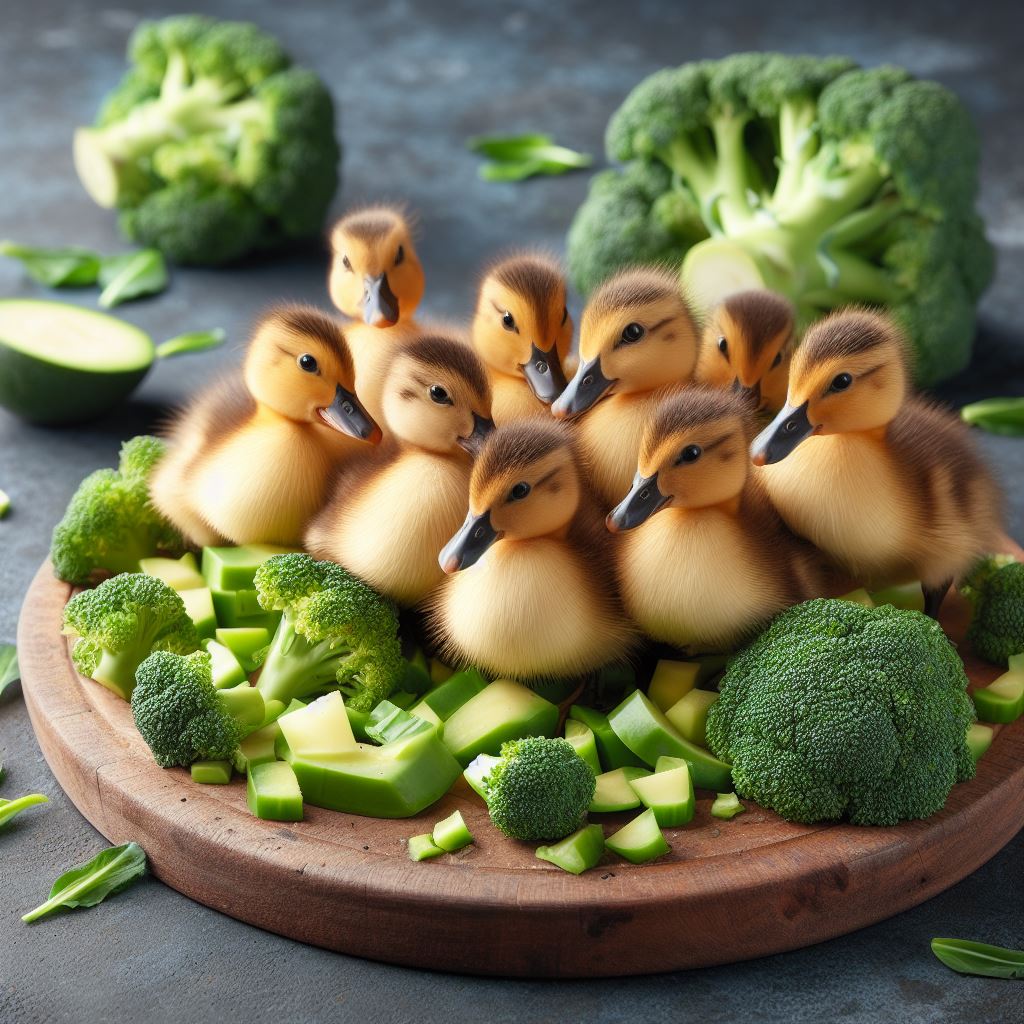
Table of content:
Broccoli is a nutritious vegetable that humans regularly consume. But what about ducks – can ducks eat broccoli too? As a duck owner, you likely want to ensure your feathered friends get the best diet possible. Read on for a helpful guide on whether broccoli is safe for ducks and how to feed it properly.
Key Takeaways:
- Broccoli is generally safe for ducks to eat in moderation. Both the florets and stalks can be fed.
- Broccoli contains healthy nutrients like vitamin C, calcium, and iron that ducks can benefit from.
- Too much broccoli can cause digestive upset in ducks. Feed broccoli in small amounts along with their regular diet.
- Only feed ducks raw, fresh broccoli – do not give moldy, rotten, or undercooked broccoli which can make them sick.
- Both wild and domesticated duck species like broccoli as an occasional treat and enrichment.
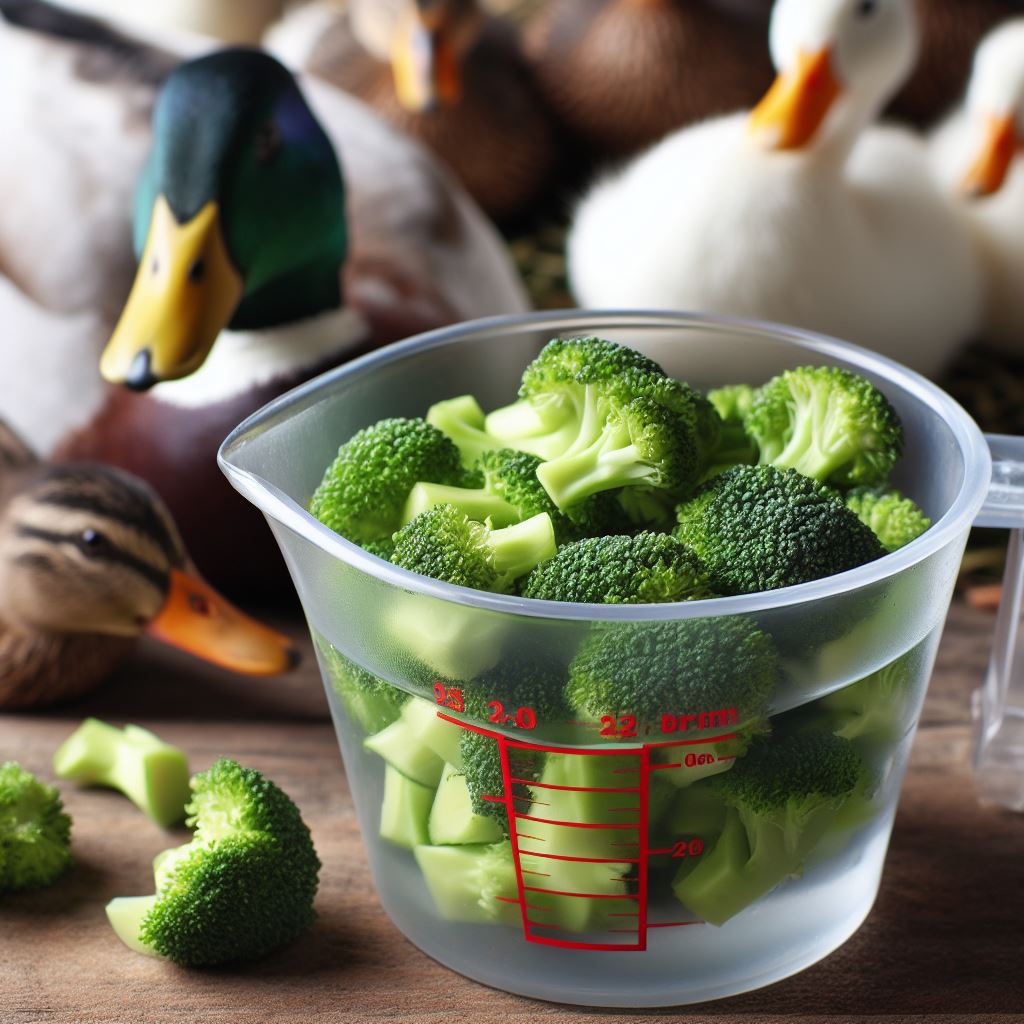 Is Broccoli Good for Ducks?
Is Broccoli Good for Ducks?
Broccoli is part of the brassica or cruciferous vegetable family, along with kale, cabbage, and other leafy greens. As an omnivore, most ducks enjoy and can safely eat a wide variety of fruits, vegetables, insects, grains, and protein. Broccoli’s vitamin and mineral content makes it a healthy supplement to a duck’s regular diet.
The florets and stalks of raw, fresh broccoli contain valuable nutrients for ducks, including:
- Vitamin C – supports immune health and tissue repair
- Calcium – needed for bone strength and egg shell quality in laying ducks
- Iron – aids in blood and energy production
- Beta-carotene – an antioxidant that converts to vitamin A to promote growth and health
- Fiber – promotes good digestion and gut function
So in moderation, broccoli can be a nutritious source of essential vitamins, minerals, and fiber to complement the balanced diet that ducks require.
Is Broccoli Safe for Ducks to Eat?
Most duck species can safely eat moderate portions of raw, fresh broccoli as part of a balanced diet. Both the green florets and the thick stalks can be fed.
However, broccoli does contain some substances that may cause digestive upset if large quantities are eaten:
- Glucosinolates – can impair thyroid function if consumed in excess
- Calcium oxalates – may cause mouth irritation or kidney stones in the long-term
- Cruciferous fiber – can cause gas or loss of droppings if ducks eat too much
For these reasons, broccoli should only comprise a small part of a duck’s overall food intake. Overfeeding broccoli may lead to diarrhea, bloating, or other signs of indigestion.
Only fresh, raw broccoli should be fed – avoid moldy, rotten, or undercooked broccoli, as bacteria or fungi could make your ducks sick. Also, do not feed ducks the broccoli stalks or leaves if they have been treated with pesticides.
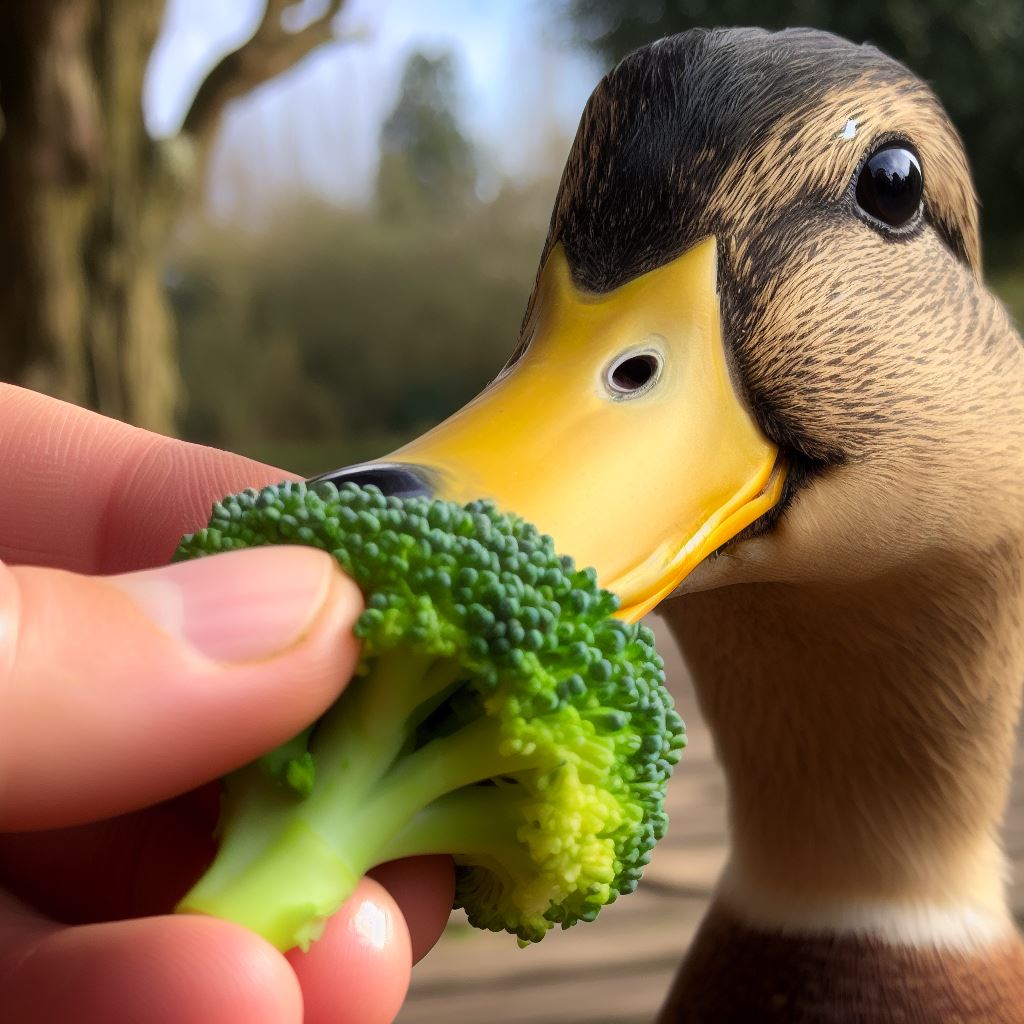 How Much Broccoli Can Ducks Eat?
How Much Broccoli Can Ducks Eat?
When feeding broccoli, moderation is key. Ducks should not eat large quantities of broccoli at one time, or daily as a main part of their diet.
For an adult duck, a few florets 2-3 times per week make a healthy treat. Chopped broccoli can also be incorporated into duck feed mixes at 10% or less.
Ducklings can eat tiny portions of soft, minced broccoli starting at 2-3 weeks old as they begin to forage. But broccoli should make up no more than 5% of a duckling’s diet. Too much can impair growth.
Watch your duck’s droppings for any signs of looseness or diarrhea after eating broccoli. Scale back the portions if their digestion seems upset. Also, provide plenty of fresh water to help flush out any excess nutrients.
With reasonable amounts, broccoli can provide nutritional variety without disrupting your duck’s digestive health. Monitor them closely for the first few times to see how they tolerate it.
How to Feed Broccoli to Ducks
Here are some tips on feeding broccoli safely and effectively:
- Chop broccoli florets into small, bite-sized pieces for easier eating. Duckbills are not designed for large bites.
- Mash or puree minced broccoli for ducklings under 4 weeks old who cannot yet swallow large pieces.
- Toss handfuls of bite-sized broccoli pieces into ponds or outdoor enclosures and let your ducks forage for them. This provides enrichment.
- Mix a few handfuls of chopped broccoli into their feed ration for a balanced meal.
- Offer broccoli florets 1-2 times per week to start. Gradually increase the frequency if ducks tolerate it well.
- Remove any uneaten broccoli within 1 hour to prevent spoilage or mold.
- Ensure broccoli makes up no more than 10-15% of total food volume at any feeding.
- Always supervise ducks when offering new foods until you see that they tolerate it.
With a few precautions, most ducks enjoy broccoli as an occasional treat and source of nutrients. Close observation of your duck’s health while adding broccoli will help you find the right amount to complement their diet.
What Types of Ducks Can Eat Broccoli?
Most common domestic and wild duck species can consume broccoli in moderation. Some examples include:
Domestic Duck Breeds
- Pekin
- Rouen
- Call ducks
- Cayuga
- Welsh Harlequin
- Ancona
- Indian Runner
- Buff duck
- White Layer duck
Wild Duck Species
- Mallard
- Muscovy
- Wood duck
- Mandarin duck
Young ducklings and older ducks may need more care with broccoli intake than healthy adults. But overall, broccoli appeals to a duck’s omnivorous appetite and provides health bonuses like vitamin C. Both pet ducks and those living on ponds or in city parks will eagerly nibble on fresh broccoli treats.
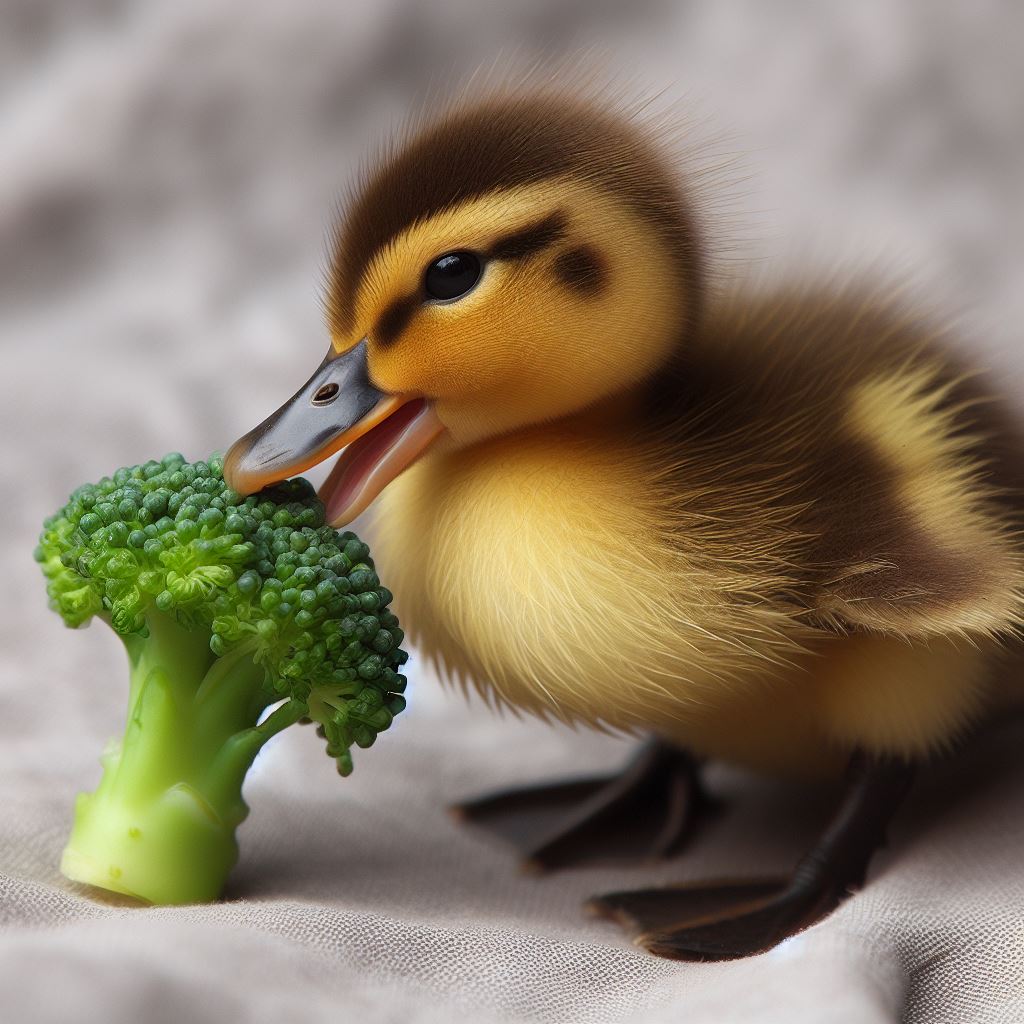 Can You Feed Broccoli Stalks to Ducks?
Can You Feed Broccoli Stalks to Ducks?
Along with the florets, broccoli stalks can also be fed to ducks safely in moderation. The stalks make up over half the weight of a broccoli head.
Chopped into small pieces, both raw and cooked broccoli stalks provide:
- Fiber for digestion
- Vitamin K for bone health
- Iron and calcium for circulation and eggshell strength
- Low calories to avoid obesity
The woody fibers are challenging for ducks to digest though. So stalks should be chopped finely and cooked to soften them before feeding. Then incorporate them along with the florets into a balanced diet.
Frequently Asked Questions
Can too much broccoli be harmful to ducks?
Yes, feeding too much broccoli can cause digestive upset and toxicity issues over time. Limit broccoli to 10-15% of your duck’s diet and watch for signs of diarrhea or poor growth and egg production. Reduce the portions if their health seems impacted.
Is broccoli high in protein for ducks?
No, broccoli is low in protein compared to other duck foods like insects, fish, and commercial poultry feed. It provides more vitamins, minerals, and fiber than protein. Ducks need adequate protein for growth and egg production, so broccoli should not replace high-protein foods.
Can broccoli stalks make ducks gassy?
The high fiber content of broccoli stalks may cause loose droppings or excess gas in some ducks. Make sure to introduce stalks chopped small and cooked to aid digestion. Stop feeding if it seems to disrupt their digestion.
Do ducks like broccoli leaves and stems?
Ducks will nibble on all parts of the broccoli plant, including tender leaves and stems along with stalks and florets. But avoid giving leaves or stems treated with any pesticides that could be toxic. Chop all broccoli plant parts small for duckling safety.
Can ducks eat broccoli raw or cooked?
Raw, fresh broccoli is preferred as cooking reduces some vitamin content. But cooking makes stalks and leaves softer and safer for ducklings to eat. For adults, offer raw florets and lightly steamed stalks before feeding.
Do wild ducks eat broccoli in ponds?
Wild ducks will readily nibble on raw broccoli florets floated in ponds or scattered along the banks. It provides a tasty supplement to their natural diet. But wildlife should not be fed broccoli exclusively or in excess amounts long-term.
Conclusion
In reasonable quantities, broccoli can be a healthy supplemental food for ducks that provides essential vitamins, minerals, and fiber. Both domesticated pet ducks and wild waterfowl enjoy nibbling on fresh broccoli once in a while.
Stick to feeding raw, fresh broccoli no more than 2-3 times per week. Chop all pieces small for duckling safety. Avoid overfeeding broccoli or parts that are rotten or moldy. With a few precautions, broccoli makes a fun and nutritious treat for your web-footed, feathered friends.
Welcome. I’m Adreena Shanum, the proud owner of this website, and I am incredibly passionate about animals, especially poultry. I founded adreenapets.com as a labor of love, stemming from my desire to share my knowledge and experiences with poultry enthusiasts worldwide.




